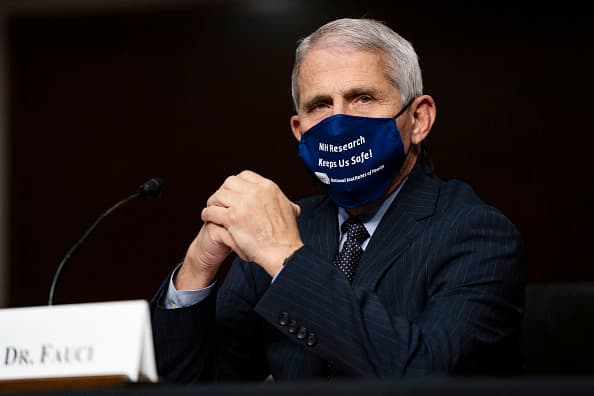(Photo by Alex Edelman-Pool/Getty Images)
Pool | Getty Images News | Getty Images
LONDON — Hopes are rising that a Covid-19 vaccine could be approved by the end of the year, with drugmakers and research centers scrambling to help bring an end to the pandemic.
Dozens of candidate vaccines are in clinical evaluation, according to the World Health Organization, with some already conducting late-stage tests before seeking formal approval.
The outcome of the trials is being closely monitored around the world.
The U.S.’s leading expert on infectious disease believes it will only be a matter of weeks before the findings of a potential vaccine will be known.
“We will know whether a vaccine is safe and effective by the end of November, the beginning of December,” White House coronavirus advisor Dr. Anthony Fauci said in a BBC interview on Sunday.
“The question is: Once you have a safe and effective vaccine, or more than one, how can you get it to the people who need it as quickly as possible?”
Fauci said a vaccine deemed safe and effective would be rolled out according to a set prioritization, with individuals such as health care workers and those in a higher risk category likely to receive the first doses. He said it would be “several months into 2021” before a vaccine becomes more widely available.
The development of a vaccine, Fauci warned, would not replace the need for public health measures to help protect people from the disease for some time.
To date, more than 43 million people have contracted the coronavirus worldwide, with 1.15 million related deaths, according to data compiled by Johns Hopkins University.
Vaccine race
The race for a Covid vaccine has seen governments step in to try to help the process along by providing funds to allow companies to scale up manufacturing even before drugs have been approved.
Leo Varadkar, Ireland’s deputy prime minister, has said he is hopeful an inoculation against the coronavirus could be approved before the end of the year.
“I’m increasingly optimistic, as is government, that we will see a vaccine approved in the next couple of months and that in the first half or first quarter of next year it’ll be possible to start vaccinating those most at risk,” Varadkar, who is a qualified doctor, told RTE radio on Sunday.
A Rehab Support worker checks on patient notes as the first patients are admitted to the NHS Seacole Centre at Headley Court, Surrey, a disused military hospital, which has been converted during the coronavirus pandemic.
Victoria Jones | PA Images via Getty Images
Not all public health experts share the same level of optimism about the development of a Covid vaccine before year-end, however.
The Mail on Sunday reported plans had been drawn up for frontline National Health Service staff to receive a coronavirus vaccine within weeks, citing an email sent by an NHS Trust chief to his staff.
In response to the report, U.K. Health Minister Matt Hancock said on Monday that it was not the government’s expectation for NHS staff to receive access to a potential vaccine this year.
He did rule out the possibility of a Covid vaccine being delivered to hospital staff in 2020 but said the bulk of the rollout would likely take place in the first half of next year.
The U.K.’s chief scientific advisor, Patrick Vallance, has said he doesn’t believe a Covid vaccine will be available for widespread use in the community until at least the spring.
He also told the National Security Strategy Committee in London last week that the coronavirus was likely to become as endemic as the annual flu.
This means the infection rate of the coronavirus, like other coronaviruses, will eventually stabilize at a constant level so that the virus becomes present in communities at all times.
Vallance said creating a vaccine from scratch took approximately 10 years on average. The fastest vaccine ever developed was for mumps, and it took more than four years.
Small bottles labeled with a “Vaccine COVID-19” sticker and a medical syringe are seen in this illustration taken taken April 10, 2020.
Dado Ruvic | Reuters
Separately, Dr. David Heymann, who led the WHO’s infectious disease unit during the SARS epidemic in 2002-2003, believes some governments may be over-reliant on the development of a vaccine at a time when effective communication, diagnostic testing and outbreak containment activities are all critically important tools.
“The difficulty right now is that in many countries, they are looking forward to a vaccine which may or may not come, which may or may not be effective in the short or long term, and they are looking at possible therapeutic (options) which could solve many of the problems,” Heymann said during a webinar for think tank Chatham House last week.
“But, that’s not a good way to proceed at present. … We have to learn to live with the pandemic.”
